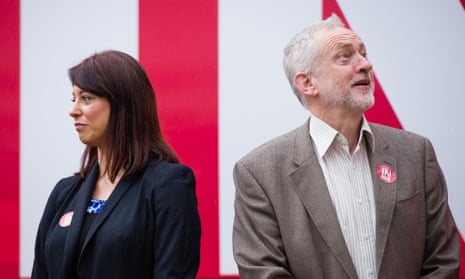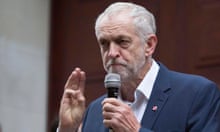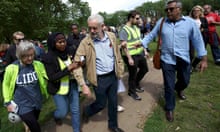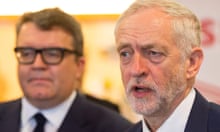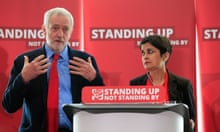Jeremy Corbyn will attempt to confront the crisis facing his leadership on Monday morning as he enters emergency talks with the deputy Labour leader, Tom Watson, amid a series of further shadow cabinet walkouts and a likely vote of no confidence from his MPs.
The Labour leader, who was left reeling after his decision to sack the shadow foreign secretary, Hilary Benn, was followed by the resignations of 11 senior shadow cabinet members, said he would not “betray the trust” of the people who voted for him by stepping down. He vowed to stand against anyone challenging him for the leadership.
But Corbyn has come under huge pressure from the resignations, which will pitch politicians against Labour party members who elected Corbyn by an overwhelming majority in a battle for the heart of the party.
Heidi Alexander, the shadow health secretary, was the first to walk out, followed by Gloria De Piero, who has represented young people and toured the country talking to Labour voters and members.
Those that followed included Lord Falconer, the shadow justice secretary, Seema Malhotra, the shadow chief secretary and Chris Bryant, the shadow leader of the Commons. In his resignation letter, Bryant told Corbyn: “If you refuse to step aside I fear you will go down in history as the man who broke the Labour party.”
Many said they believed the cataclysmic loss of the EU referendum had created a sea change of opinion among the party’s membership.
Others argued the turmoil in the Tory party, caused by the shock Brexit vote and leading to the possibility of a general election within months, had forced them to act, with further senior figures expected to resign on Monday.
The shadow business secretary, Angela Eagle, was among those thought to be considering their positions, with a string of more junior shadow ministers also likely to step down, and council leaders expected to speak out. Many are pointing the finger of blame at Corbyn over the EU referendum, with Phil Wilson, the MP who chaired the parliamentary campaign to remain in Europe, accusing his leader of consistently trying to “weaken and sabotage” the pro-EU effort.
Watson, who will be a key figure in determining whether the leader can survive, intervened on Sunday evening to say he was saddened about the resignations.
But in a blow for Corbyn, his deputy, who was forced to rush back from Glastonbury festival, also said he was deeply disappointed about the sacking of Benn and could add his voice to those urging him to resign.
Arguing that his focus was keeping his party together through turbulent times, Watson said: “It’s very clear to me that we are heading for an early general election and the Labour party must be ready to form a government. There’s much work to do.”
Corbyn responded late on Sunday, saying he regretted the resignations but was determined to reshape his shadow cabinet over the next 24 hours. “I was elected by hundreds of thousands of Labour party members and supporters with an overwhelming mandate for a different kind of politics … I am not going to betray the trust of those who voted for me– or the millions of supporters across the country who need Labour to represent them.
“Those who want to change Labour’s leadership will have to stand in a democratic election, in which I will be a candidate,” he added, arguing that the referendum result underlined how shut out of the political system millions felt.
Writing in the Guardian, Len McCluskey, the general secretary of the Unite union, warned MPs tweeting and briefing against their leader that they could face mandatory deselections if they continued with their disloyalty. “Those Labour MPs plunging their party into an unwanted crisis are betraying not only the party itself but also our national interest at one of the most critical moments any of us can recall,” he wrote.
The grassroots movement Momentum also began mobilising to protect Corbyn, with phone banks being set up to contact up to 100,000 supporters ready for another leadership battle. A petition had attracted almost 200,000 signatures to save the leader, and a protest is being planned outside parliament on Monday evening at the same time as the leader will face the vote of no confidence.
The rebels hope that they can challenge Corbyn to the leadership, and that he will be unable to stand because he will fall short of the required nominations from MPs.
Any contest is likely to trigger a bitter legal challenge. One piece of advice from lawyers, leaked to the Guardian, suggests that the leader may automatically have the right to run again without backing from Labour politicians. The document states that an “election triggered by a challenge to the incumbent” does not involve “the case of a vacancy” so does not require the leader to attract nominations. A challenger, however, would need the backing of 20% of Labour’s Westminster and European parties.
But a national executive committee source said the party had separate advice that had drawn the opposite conclusion, and argued that there was a historic precedent for leaders to have to seek out nominations in the case of a challenge.
The Guardian understands that rebel politicians are planning to poll Labour members as they work together to decide the best way in which to depose their leader. Potential leadership challengers, such as Dan Jarvis and Angela Eagle, are prepared to work together to decide which candidate has the best chance of toppling Corbyn.
Rumours in Westminster were that the MPs had organised themselves via a WhatsApp group called “the birthday” with one supporter of Corbyn saying information about the coup had been passed on to the leadership team, including the fact that Powell was likely to resign.

One organiser said: “The plan is to make Corbyn’s job as leader extremely difficult in the hope of pushing him to resign, with most MPs refusing to serve as shadow ministers, show up on the frontbench in the House of Commons, support him at PMQs or formulate policy under his leadership.”
De Piero told Corbyn in her resignation letter that she had a “warm personal relationship” with the Labour leader but added: “I do not believe you can deliver that victory at a general election, which may take place in a matter of months. I have been contacted by many of my members this weekend and it is clear that a good number of them share that view and have lost faith in your leadership.”
Powell told Corbyn that she had enjoyed her role, which included pushing the government to drop plans for forced academisation of schools. She said she found her leader “decent, principled and kind”, but added: “However, it is increasingly clear that your position is untenable and that you are unable to command the support of the shadow cabinet, the parliamentary Labour party, and most importantly the country.”
Greenwood told the Guardian she had told Corbyn that the party needed unity, and she felt that was only possible under new leadership. “The EU referendum has exacerbated fault lines within the party and our supporters, and those divisions are still widening,” she added.
Perhaps the biggest surprise resignation was Malhotra, who was seen as an MP who had behaved loyally and would stand by Corbyn. Some suggested she was working on behalf of the shadow chancellor, John McDonnell, a charge that was fiercely denied by both teams.
McDonnell said Corbyn was going nowhere, and questioned if his opponents had got enough sleep since the EU referendum last week. He said: “We are on the path of building a majority government for Labour … I think they should calm down and listen to their members.”
Other allies of Corbyn also waded in, with Diane Abbott, Emily Thornberry and Jon Trickett offering support. “We need to get on with the business of offering an alternative vision of a Britain outside the EU to the one offered by [Michael] Gove and [Nigel] Farage, which is a small-minded, inward looking and chauvinistic,” said Trickett.
Abbott, the shadow international development secretary and a staunch supporter of Corbyn, said some of her colleagues had been planning to launch a coup for months, whatever the result in the EU referendum.
She said the challenge to his leadership was “a recipe for unhappiness”, adding: “There has been a plan to challenge Jeremy for a long time, because many have failed to reconcile themselves with his victory last year.”
